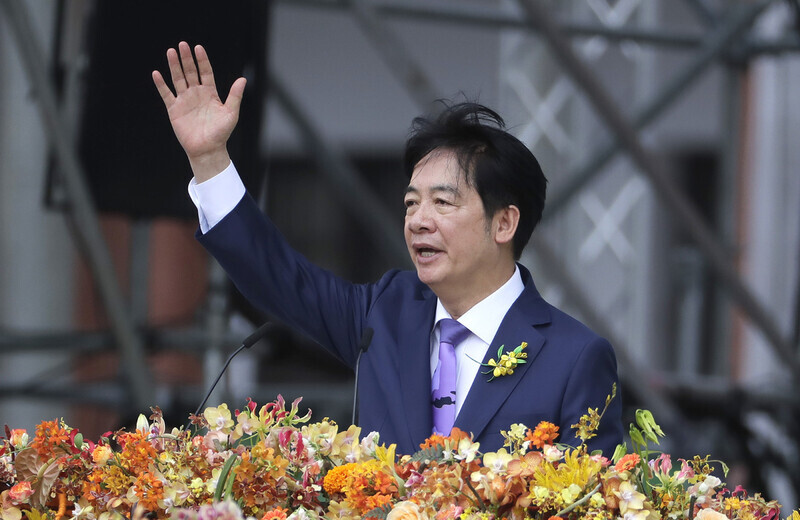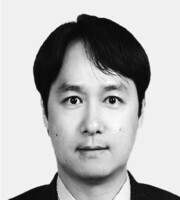hankyoreh
Links to other country sites 다른 나라 사이트 링크
[Column] Taiwan’s new president bucked China’s silent demands for neutrality — now what?


By Wang Hsin-Hsien, distinguished professor at the Graduate Institute of East Asian Studies at National Chengchi University
Last week, Taiwanese President Lai Ching-te delivered his inaugural address titled, “Building a Democratic, Peaceful and Prosperous New Taiwan.” China’s Taiwan Affairs Office immediately responded to the speech by accusing Lai of being a “separatist” who has “kept colluding with external forces to make provocations of seeking ‘Taiwan independence.’” Chinese Foreign Minister Wang Yi and China’s state media heavily criticized the speech. The People's Liberation Army Eastern Theater Command held large-scale combat exercises on May 23 and 24 along the Taiwan Strait. What should we make of this situation?
Let’s compare this reaction to Beijing’s responses to Lai’s two Democratic Progressive Party predecessors. President Chen Shui-bian declared his “Four Noes and One Without” pledge in 2000, promising to not formally declare Taiwan’s independence. Beijing responded by accusing him of “lacking sincerity” and saying they adopt a “wait-and-see posture.”
In 2016, President Tsai Ing-wen gave a relatively moderate speech, which Beijing called an “incomplete answer sheet.” This time around, however, Beijing has overtly accused Lai of being a separatist, offering a much more confrontational stance. If both sides continue in their current trajectories of no-compromise rhetoric, then relations are bound to worsen.
It’s notable that throughout his speech, Lai continually referred to the authorities in Beijing as “China.” He also stated that “the Republic of China [Taiwan] and the People's Republic of China are not subordinate to each other.” Beijing has interpreted this statement as an open declaration of Taiwan as a separate, sovereign nation.
“Tonight we will be welcoming our distinguished guests at a state banquet in Tainan, the city where 1624 marked Taiwan's links to globalization,” Lai declared.
“Now, as we stand here 400 years after that historical moment in Tainan, we in Taiwan must all demonstrate confidence and bravely set course for the new world, so that the world may embrace a new Taiwan,” he added.
These remarks look like an attempt to distinguish the history of Taiwan with that of mainland China. When former Taiwanese President Ma Ying-jeou met with Chinese President Xi Jinping in Beijing in April, Xi continually referred to the “Chinese people” and “Chinese culture” to emphasize common heritage. It was also a message for Lai to follow suit, a silent demand to maintain a “neutral” stance when it comes to cross-Strait affairs.
Yet Lai did not comply — to China’s chagrin.
The latest round of China’s military exercises, dubbed “Joint Sword-2024A,” were of a much larger scale than the exercises China held to protest US House Speaker Nancy Pelosi’s visit to Taiwan in August 2022. They were also physically closer to Taiwan. It’s worth noting that these exercises were “2024A,” meaning there is a high chance of “B” and “C” rolling around in the near future.
Judging by how various aircraft and destroyers were positioned during the exercises, the focus of the drills went beyond mere containment of Taiwan and extended to “internalizing” the Taiwan Strait. This also marks the first time that Beijing has officially referred to the “island chain strategy,” meaning the exercises were a simulation of a naval offensive involving the “first island chain” of Okinawa, Taiwan and the South China Sea. This has grave implications for the stability of the surrounding region.
China also sees the US as the main player behind Lai’s stance. China has recently announced sanctions against 12 US arms companies that have sold weapons to Taiwan. Before announcing increased tariffs on Chinese electric vehicles, the Biden administration in the US accused China of “overcapacity” and excessive production when it comes to state subsidies for EVs. Lai’s speech will surely amplify Beijing’s suspicions regarding Washington, despite Biden and Xi stressing the “importance of peace and stability in the Taiwan Strait” during their summit in San Francisco last year.
The sensitivity and volatility of such issues are bound to only increase as the US presidential election in November nears. Taiwan and the surrounding region of East Asia should keep a close eye on things going forward.
Please direct questions or comments to [english@hani.co.kr]

Editorial・opinion
![[Editorial] It’s time for us all to rethink our approach to North Korea [Editorial] It’s time for us all to rethink our approach to North Korea](https://flexible.img.hani.co.kr/flexible/normal/500/300/imgdb/original/2024/0621/7517189559819182.jpg) [Editorial] It’s time for us all to rethink our approach to North Korea
[Editorial] It’s time for us all to rethink our approach to North Korea![[Column] Why empty gestures matter more than ever [Column] Why empty gestures matter more than ever](https://flexible.img.hani.co.kr/flexible/normal/500/300/imgdb/original/2024/0619/7217187833478369.jpg) [Column] Why empty gestures matter more than ever
[Column] Why empty gestures matter more than ever- [Editorial] Seoul’s part in N. Korea, Russia upgrading ties to a ‘strategic partnership’
- [Column] The tragedy of Korea’s perpetually self-sabotaging diplomacy with Japan
- [Column] Moon Jae-in’s defense doublethink
- [Column] S. Korea-China cooperation still has a long way to go
- [Editorial] Seoul must use tact and diplomacy to check deepening Russia-NK ties
- [Editorial] Thorough audit, evaluation of oil test drilling are needed
- [Editorial] Yoon prioritizes his administration over South Korea’s safety once again
- [Column] The monumental shift in N. Korea’s nuclear program that never happened
Most viewed articles
- 1[News analysis] N. Korea’s new pact with Russia is ‘mirror image’ of Yoon’s alliance with US
- 2[Editorial] It’s time for us all to rethink our approach to North Korea
- 3Seoul decries N. Korea-Russia mutual defense pact as ‘absurd’
- 4North Korea’s real motive for publishing the full text of new treaty with Russia
- 5Hot weather hat trick to send the mercury soaring in Korea
- 622 years later, Korean girls killed by US troops remain a symbol of the price of military tensions
- 7[Column] Why empty gestures matter more than ever
- 8[Editorial] Fortified N. Korea-Russia ties should be a wakeup call for Seoul
- 9Park‘s address from 10 years come back to her
- 10The harrowing real-life stories of the Korean military coup depicted in “12.12: The Day”